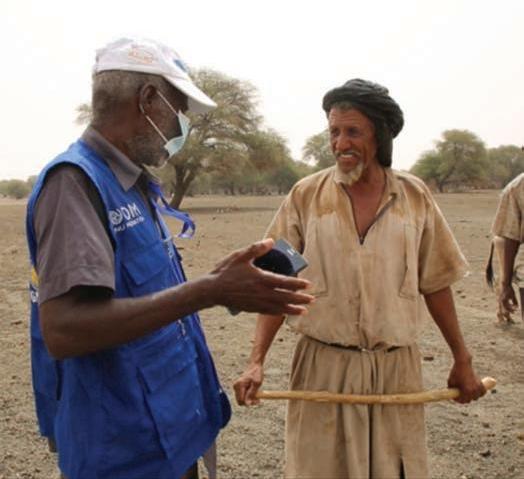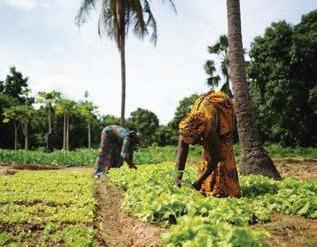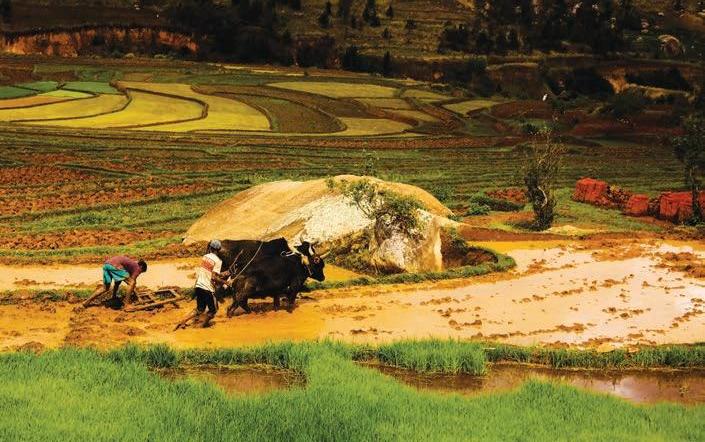
13 minute read
Contents
Nigeria sets up a 200,000 yam capacity facility
THE NIGERIAN GOVERNMENT has set up a 200,000 yam capacity market in Zaki Biam, a local government area in Benue State, North Central Nigeria.
Inaugurating the market, Yemi Osibanjo, vice-president of Nigeria, explained the strategic nature of the market. Osibanjo said, “The Zaki Biam International Yam market is probably the biggest yam market in the world because Nigeria is the largest producer of yams in the world. It accounts for sales of possibly 70 per cent of yams that are cultivated in the country. More than 200 trucks loading close to two million tubers of yams go out of that market every week.”
“However, the market has very little storage capacity and its infrastructural facilities are way behind its capacity and the size of commerce that goes on there every day. Apart from that, post-harvest losses have been a major problem of agricultural production in Nigeria. Nigeria produces 17mn tonnes of yams annually but loses up to 40 per cent on account of inadequate storage and processing facilities.”
The Zaki Biam Market comprises of facilities shared by the yam sellers and framers in the market and entailed the construction of 660
Lack of infrastructural facilities is a major problem for agricultural production.
units of stalls/sheds; a police station; a market administrative building; solar; powered borehole; internal road with drainage; installation of solar street lights asides two units of warehouses with a combined capacity to the 200,000 tubers of yam.
“The shared facility is an opportunity to improve the working and trading environment for small and medium-sized businesses. This is because most individual businesses cannot, on their own, afford the equipment necessary for their businesses.”

USAID announces support for new supply-chain management training centre in Africa
THE US AGENCY for International Development (USAID) announced US$15mn, on 14 July 2020, to support a partnership between Arizona State University and the Kwame Nkrumah University of Science and Technology in Ghana.
The aim is to create an innovative research and training centre to improve African supply-chains.
The new centre for Applied Research and Innovation in Supply Chain-Africa (CARISCA) will train researchers and practitioners, produce new research, and translate and apply state-of-the-art research from around the world to improve local supply-chains, particularly in health care and agriculture. Understanding local needs and improving how local products and services, such as food or critical medical supplies, move from producers to customers is critical to developing strong, self-reliant economies, and for reaching the poor and marginalised across Africa.
The partnership aims to establish Kwame Nkrumah University of Science and Technology as Africa's preeminent source of expertise on the sustainable management of supply-chains, become a resource for researchers in Ghana and across Africa to drive innovative research and training to improve African supply-chains, particularly for women and the most-disadvantaged customers and producers and leverage the private sector, governments, and civil-society partners to connect African businesses, researchers, and practitioners in supply-chain management to global resources.
IOM launches Transhumance Monitoring Tool


THE INTERNATIONAL ORGANISATION for Migration has launched a Transhumance Monitoring Tool, which allows them to collect information about population movements across a feed to livestock farmers, but it is not enough,” said Babiyé Ould Balemine, who participated in the IOM survey. “This year, due to the COVID19 afflicted border closures, Image Credit: IOM.C/Ly large area, its direction and the decreed by Western and Central challenges faced by the nomadic African governments, herders farmers who relocate to different and cattle are stranded in the regions in a year, for work and border areas between Mauritania sustenance. and Mali, without any resources
Every year, thousands of to feed their livestock. Since they herders living in Africa’s arid are no longer able to travel to Sahelian region, cross over to Mali, they are stranded and Mauritania or Mali during the deprived. A large concentration lean season, seeking greener of herders and their herds have pastures for their livestock. been reported in the commune of "During this period, there is Adel Bagrou, on the border with plenty of green grass on the Mali,” revealed Aliou Hamadi Malian side. Mauritanian Kane, coordinator of the herders used to go there, but the Groupement National des closing of the borders has Associations Pastorales (GNAP), Border closures have deeply impacted the livelihood of nomad farmers in Sahel, who disrupted the flow. The a Mauritanian herders keep shifting bases with seasons. Mauritanian government offers association. “The presence of thousands of corridors in Africa, since herders along the small border February 2019, conducted a areas has led to the mixing of flow monitoring survey, between livestock and creating tensions May and June 2020, where 16 between them, especially at per cent of herders were water points,” he added. The unaware of any of the COVIDimpact of this situation on liveli19’s preventive measures. As a hoods and cattle health is remedy, IOM launched an considerable. awareness campaign to combat These tensions are the spread, and installed handcompounded by health risks washing facilities in the areas which COVID-19 poses. “Many where the stranded herders Malian and Mauritanian herders are living. Their campaign do not distinguish the territories reached more than 1,200 people on which their cattle graze. These in the region. are roads people have travelled The IOM project was funded for years and years,” Babiye by the Government of Japan and explains. the European Union, through the The IOM and Groupement EU-IOM joint initiative, for National des Associations Migrant Protection and Pastorales (GNAP), whose teams Reintegration and Strengthening The Transhumance Monitoring Tool helps collect information about population movements have been working on Border Management in across a large area, its direction and the challenges faced by the nomadic farmers. understanding the transhumance Mauritania.
CNH Industrial signs agreement for agriculture networks in Southern Africa
CNH INDUSTRIAL HAS announced its plan to expand direct presence in Southern Africa’s agriculture and construction equipment sectors.
The company is moving to strengthen its local presence with the planned purchase of four divisions of Capital Equipment Group (CEG), previously owned by Invicta Holdings Limited. These include:
Northmec: South Africa’s most established agricultural equipment distributor and the sole distributor of Case IH equipment and implements.
NHSA: A spare parts distributor in Southern Africa mainly focused on agriculture.
CSE: A well-established equipment distributor operating for more than 50 years in the market and the sole distributor of CASE tractor loader backhoes and skid steer loaders.
Landboupart: A distributor of spare parts and implements.
By taking full operational management of its commercial distribution and aftermarket network, CNH Industrial aims to further develop its Case IH and CASE Construction Equipment brands’ presence together with aftermarket sales and services in South Africa and other Southern African markets, strengthening its position and ties with its customer base.
This model is already in place for the company’s agriculture equipment brand New Holland Agriculture as well as its commercial and specialty vehicles business via its IVECO, IVECO ASTRA and IVECO BUS brands.
Afrika Umoja and Black Farmers Association of South Africa tackle COVID-19

AFRIKA UMOJA HAS announced a partnership with the Black Farmers Association of South Africa (BFASA) to set up and distribute disinfecting products throughout the country. The partnership will enable BFASA to set up operational deepImage Credit: Riccardo Mayer/ Adobe Stock cleaning and sanitising Afrika Umoja and BFASA will distribute disinfecting teams and build hand products across South Africa, and educate people on operated stations that how to sanitise. spray mist onto surfaces and sites throughout the country, as well as supply the market with their product, Santab. It is produced in South Africa and sold as effervescent tabs that can be dissolved in five litres of water.
Afrika Umoja and BFASA will use their networks to distribute the Santabs and disinfecting products across South Africa, and also intend to educate people on how to sanitise, especially in rural areas.
BFASA is an association that has a membership of 50,000 farmers including farmers on small pieces of land, farmers with a small turnover and smallholder farmers in all nine provinces.

AfDB project in Tanzania tripled incomes of rural producers and traders
AN AFRICAN DEVELOPMENT Bank project to enhance market infrastructure, value addition and rural finance (MIVARF) in Tanzania produced highly satisfactory results, according to a report released by the project team. The project, rolled out in the country between 2012 and 2017 increased the incomes of rural producers and traders threefold.
With US$56.8mn in funding from the African Development Bank, the programme was undertaken in 32 districts with a population of 6.1 million in 1.2 million households. "This increase is attributable to the sale of value-added products, improved access to markets, increased productivity, the use of improved techniques (including the System of Rice Intensification and the use of fertiliser and improved seed) and enhanced capacity to negotiate better prices," explained project team lead Salum Ramadhan.to negotiate better prices," explained project team lead Salum Ramadhan.
Small producers and traders gained greater access to agricultural markets, which cut their post-harvest losses of staple crops. One beneficiary, the Meru Dairy Company, recorded a nearly 85 per cent spike in production: establishment of a cold room boosted the company’s milk-production capacity from 400 to 2200 litres. "Despite challenges in terms of coverage, the programme has worked well thanks to the efficiency of communication with the district and regional liaison officers, and to the good relationships established with district and regional political and administrative structures," according to the project completion report.
Madagascar receives ARC Insurance payout for drought
THE GOVERNMENT OF Madagascar received a symbolic cheque on 7 July 2020 for US$2.13mn from the African Risk Capacity Insurance Company Limited (ARC Ltd) to cover anticipated losses to livelihoods from crop failure in the just concluded farming season.
The ARC payout is the result of drought insurance taken by the country with the support of the African Development Bank, through the Africa Disaster Risk Financing (ADRiFi) programme, which financed 100 per cent of the 2019-20 insurance premium for sovereign drought risk transfer for the Republic of Madagascar.
The Minister of Economy and Finance, Richard Randriamandrato, during the official handover ceremony stated, "The drought insurance of African Risk Capacity is one of the sustainable solutions to strengthen the efforts of the government and partners in the Southern region of Madagascar. It demonstrates the mutual assistance between friendly African countries to respond efficiently to natural disasters, particularly drought. Such a mechanism is beneficial for Madagascar as it will enable us to improve the conditions of farmers and the livelihoods of vulnerable populations in the 'Great South' that are victims of recurrent drought, as well as to preserve their production capital. Early interventions to be implemented with this fund will focus on unconditional cash transfer and Cash for Work (CFW) for 15,000 vulnerable households, nutritional support for 2,000 children under five years of age, and water supply for 84,000 households. Thus, this insurance mechanism supports the implementation of the National Disaster Risk Management Policy and Strategy, particularly the promotion of financial resilience to climatic hazards."
Madagascar faces disaster risks from an increasingly variable and changing climate, which add to the challenges of widespread food insecurity.
Madagascar faces disaster risks from an increasingly variable and changing climate, which add to the challenges of widespread food insecurity.
UN-ASG Mohamed Beavogui, the director-general of African Risk Capacity said, “The payout made by ARC to support the drought-affected population in the Great South region was made possible thanks to the leadership and commitment of the government of Madagascar to protect its people. We also thank the AfDB for their laudable support through the ADRiFi programme. This is a vivid testimony that collaboration between African governments and development partners, both within and outside the region, using market approaches can go a long way in saving developmental gains on the continent.
“Our purpose in working with Member States to provide disaster risk insurance is targeted at promoting resilience and providing financial protection to the vulnerable population when perils occur”, remarked Lesley Ndlovu, the CEO of ARC Insurance Limited.
“The insurance policy payout is timely, with Madagascar also facing the challenges of dealing with the current COVID-19

pandemic. It demonstrates that risk transfer programmes can help countries manage the risks of climate-related disaster and release pressure on public finances when multiple crises occur,” said Dr Jennifer Blanke, vice president for Agriculture, Human and Social Development, AfDB.
“Madagascar’s accession to the drought insurance mechanism as part of this ADRiFi programme is a very encouraging initiative. The collaboration between the Malagasy Government, ARC and the AfDB is still as fruitful in terms of developing a financial protection mechanism in the face of disaster risks. The sustainability of this tripartite collaboration will allow us to open doors of extensions to other risk areas of the country or even for other types of climatic hazards such as cyclones, floods and epidemics,” said General of Air Brigade Mamy Razakanaivo, Executive Secretary of the CPGU (Prevention and Support Unit for Emergency Management) within the Prime Minister's Office and Supervisor of the ARC programme in Madagascar.
Evonik carried out research to investigate the effect of the product Ecobiol on necrotic enteritis challenge caused by Clostridium perfringens.
Ecobiol ameliorates impact of broilers’ enteric pathogen
NECROTIC ENTERITIS (NE) disease is estimated to cause a US$6bn annual loss for the global poultry industry and, therefore, several studies have been conducted in order to develop an alternative treatment following the ban of antibiotic growth promoters.
The research on the effect of B. amyloliquefaciens CECT 5940 (Ecobiol) on necrotic enteritis was conducted by Dr Shubiao Wu at New England University in Australia.
Ecobiol may favour the proliferation of lactic acid bacteria. In addition, this bacterium may cross-feed other families of bacteria that can use lactate to produce butyrate such as Ruminococcaceae and Lachnospiraceae. Butyrate is known to have a positive effect on energy metabolism and gut health. Therefore, the reduction of CP in combination with the use of Ecobiol may have a synergic effect in the control of C. perfringens, avoiding major issues with NE.
Trial design: The trial consisted of four treatments
● Non challenged ● Non challenged + 0.5g/kg Ecobiol 500 (1 x 106 CFU/g of B. amyloliquefaciens
CECT 5940) ● Challenged ● Challenged + 0.5g/kg Ecobiol 500 (1 x 106 CFU/g of B. amyloliquefaciens
CECT 5940) Challenged birds received an inoculation of 1ml Eimeria (5,000 sporulated oocysts each of E. maxima and E. acervulina and 2,500 of E. brunetti) at day nine and 1ml of C. perfringens (108 CFU) at days 14 and 15. Feed and water were provided ad libitum during the experimental period. The diets were provided in pellet form.
Results:
● The necrotic enteritis challenge significantly reduced performance of birds, as measured by lower feed intake, lower weight gain and higher FCR ● Overall, the addition of Ecobiol 500 significantly improved these parameters.
Inclusion of Ecobiol 500 in the research by Evonik helped to reduce the impact of necrotic enteritis.

The investigation showed that Ecobiol 500 inclusion was able to reduce the impact of the disease challenge, improving bird performance.
● Furthermore, Ecobiol 500 inclusion was able to reduce the impact of the disease challenge, improving bird performance. ● Measurements of enteric short chain fatty acids showed a significant increase in
Butyric acid levels when Ecobiol 500 was included in the diet. ● Finally, amino acid digestibility was improved overall by about 1.5 per cent when Ecobiol 500 was used.
Conclusion:
● Inclusion of Ecobiol 500 helped to reduce the impact of necrotic enteritis, and may, therefore, be a useful tool to mitigate the effects of this condition. ● Improved digestibility of amino acids not only leads to improved performance but may also reduce substrate upon which problematic microorganisms like Clostridium perfringens might thrive. ● Elevated levels of butyric acid are associated with better gut health overall and with improved performance.
About Evonik
Evonik, one of the world leaders in specialty chemicals, goes beyond chemistry to create innovative, profitable and sustainable solutions for customers.The company is active in more than 100 countries around the world.
In this article, Evonik mentions the main findings of this research. For full details, please contact the Evonik representative in your region to get the Facts and Figures document (Facts and Figures Poultry No 15179). h






